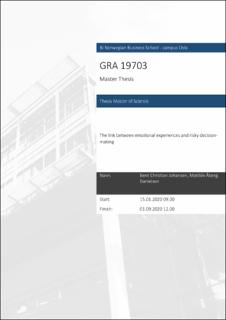The link between emotional experiences and risky decisionmaking
Master thesis

View/
Date
2020Metadata
Show full item recordCollections
- Master of Science [1621]
Abstract
Several studies have investigated the topic of emotional experiences and
information processing in relation to decision-making (LeDoux, 1994; Panno,
Lauriola & Figner, 2012). With a between-subjects experimental design, we
investigated whether emotional regulation (ER) techniques reduced high levels of
arousal, simulated by a fearful video, and then influenced risky decision-making.
We also examined whether information processing and levels of arousal had a
mediating effect on risky decision-making. Findings suggest that the stimuli
reduced levels of positive mood but did not decrease levels of negative mood.
Arousal was seen to correlate with negative mood before and after the stimuli as
well as positive mood after watching the video. Analytical and intuitive processing
correlated with positive mood before and after the stimuli. Analytical processing
was not seen to be more evident than intuitive processing when making a risky
decision, suggesting for a dual process. The mediators did not have any significant
effect on the relationship between the ER techniques and risky decision-making.
There was no difference between the ER techniques in relation to the mediators
(arousal and analytical processing) and risky decision-making. Suggesting that the
techniques could be equally effective or simply not effective at all. Gender was
found to have an effect on the relationship between the ER techniques and risky
decision-making, suggesting a further association with the appraisal tendency
framework. Theoretical and practical implications are discussed along with
limitations.
Description
Masteroppgave(MSc) in Master of Science in Leadership and Organizational Psychology - Handelshøyskolen BI, 2020